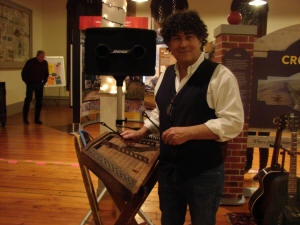|
 One thing that Atlanta wanted to do was add one final
piece to the journey through rural America by showcasing the music
of the era. And there is no better person to do that than Chris
Vallillo. One thing that Atlanta wanted to do was add one final
piece to the journey through rural America by showcasing the music
of the era. And there is no better person to do that than Chris
Vallillo.
Vallillo is an Illinois native and nationally recognized singer and
songwriter who spreads roots music all over the nation. He came to
the Atlanta Museum Friday evening to present a concert that meshed
beautifully with the current exhibit on rural life.
Not only does Vallillo sing and play vintage guitars, he composes
music, tells stories, repairs rare instruments, and is a noted music
historian. His albums have topped the roots music and folk charts
nationally. In short, he is a musical renaissance man.
The title of Friday’s concert was “The Farmer is the Man,” the title
of a song and a homage to those who feed us. As the joke goes,
“Never criticize a farmer when your mouth is full,” said Vallillo.
He chose two resonator guitars and one acoustic guitar for his
Friday evening concert. A resonator guitar has a built-in amplifier
that is used to enhance the volume of the guitar. They were designed
in an era before there were speakers.

Chris Vallillo and a
dulcimer built in 1880 in Vermont, Illinois, that he rescued from a
barn and restored.
He also brought along a historic and rare dulcimer.
This one was built in 1880 in Vermont, Illinois, by noted instrument
builder Daniel Van Antwerp. But let Chris tell the story of his rare
discovery. “I was talking to a friend who told me about an old
dulcimer in his barn. I went out and dug through the straw and other
things that one finds in a barn and finally came across this ancient
instrument. It was in terrible condition,” he said.
He took the dulcimer to a friend and asked what it was and if it
could be repaired. It turned out to be a rare instrument built in
1880 made of black walnut, white oak, pine, and hand forged nails.
Yes, it could be restored.
Vallillo spent months lovingly disassembling it and
then bringing it back to its former glory. When the forty-seven
strings are struck with the hammers that are used to play it, a
sweet sound fills the room.
Why is Chris Vallillo interested in roots music, the
sounds created and enjoyed by generations gone by? “These
traditional songs tell a story about rural life that no longer
exists, an era when neighbors could depend on one another and when
songs were a way of connecting”, he said. “This music gave
generations of rural folks a sense of community for a self
sufficient society. The songs talk about our heritage. They were a
big part of social life in an era gone by,” he said.
[to top of second column] |

His play list reads like a history lesson from an
early era of rural life. There is “The Field Behind the Plow” by
Stan Rogers and Woody Guthrie’s remembrance of the worst day of the
dust bowl “So Long, It’s Been Good to Know You.” Vallillo's own
“Silhouette Against the Stars” speaks of the beauty of a farmstead
at night.
As described by the Atlanta exhibit “Classrooms and Community,” one
room school houses dotted the landscape in the 19th and early 20th
century so that no child had to walk more than one mile to get to
school. The names of these schools provided fodder for Vallillo's
funny song, whose lyric is made up of only the names of the schools,
some historic and some with such unusual and downright goofy names
that no one now can explain where they came from.
“I’m glad that the Atlanta exhibit chose to focus on one room
schools, a type of education that worked well,” he said.

Vallillo sang Greg Brown’s song “Canned Goods” that pays tribute to
the hearty souls that built gardens that fed a family for a year.
Albert Brumly, a farmer in Missouri, had a song come to him while he
was plowing, but he had to wait until dusk after chores were done to
write it down. That is the popular gospel song “I’ll Fly Away.”
“Dances were a way for far flung farm families to get together for a
social evening, and one of the most requested songs at the turn of
the 20th century was ‘Golden Slippers,’” said Vallillo. It is still
popular and the entire audience joined him on the chorus.
The second floor of the Union Hall Atlanta Museum rang with the
sounds of songs and stories as Vallillo took his rapt audience
through a tour of a rural America that no longer exists.
He also gave a shout out to the wonderful acoustics of the second
floor space. “I really like performing here for another reason.
Small museums such as Atlanta are essential to keeping the items of
our history safe. I know that 80 percent of all items of historic
value to America are exhibited in small museums that are really
accessible. They are everywhere, and what they hold dear for us can
never be absorbed into large museums,” he said.
This is high praise for the Atlanta Museum from a man who has
brought traditional American music to the world.
[Curtis Fox] |